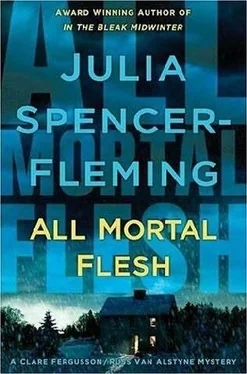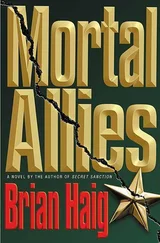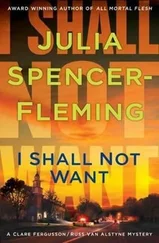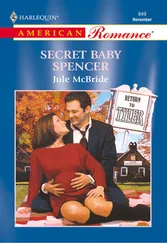She gave him a crooked smile. “Are you telling me you’ve never brought your friends in here to give them a good creep-out? Or maybe a girl, so she can scream and hold on to your neck? I bet with the lights out, this place is better than the haunted house at the fair.”
Aaron ducked his face, but not quickly enough to hide his grin.
“Has Quinn Tracey ever been in here?”
He looked up again. “Sure. He thinks it’s way cool. His mom and dad-they just want their meat to appear in little plastic packages at the supermarket. God forbid you see how it actually gets there. But Quinn’s not like that. To tell the truth”-he dropped his voice-“he wants my life. He’d love to be a farmer, or a soldier. Of course, he can’t tell his p s, because they’d have a heart attack if he didn’t go to college.”
Clare leaned on the stainless steel table. In size and height, it was not unlike the altar at her church. A chill reminder that her God had once required the blood of animals to be spilled before Him as a sin offering. “Aaron,” she said. “What was it you wanted to tell me that you couldn’t say in front of your mother?”
He folded his arms and stared at his boots. When he finally looked up at her, his face was a picture of indecision. “I’m not sure if I should tell this. Quinn’s my best friend, and I don’t want to get him in trouble.”
“You’re a smart boy, Aaron. I think you know that if Quinn’s doing something that could get him into trouble, sooner or later he’ll be found out.” Clare ran her fingers across the surface of the table. She could trace a score of fine lines almost invisible to the eye. The memory of the knife. “The question is, will he be found out before or after he hurts himself?”
“It’s not-I don’t know that he’s doing something.” Aaron blew out an exasperated breath. “Okay, this is the thing: We didn’t just drive by the Van Alstynes’ house. Quinn parked the truck and went in. He said he hadn’t been paid. He was in there for a long time.”
“How long?”
“I dunno. I listened to maybe half a CD while I was waiting.”
“So, half an hour or thereabouts?”
“That sounds right. So then he came out, and he was acting all weird. We drove off, and that was the end of it, right? Except later? At school? He told me that we had never stopped there. We just drove by.”
“Did you really see the Honda Civic in the driveway?”
“Yeah, that was there. That was why, after we found out Mrs. Van Alstyne had been killed, I thought we should say something to the police. Then Quinn told me we couldn’t, because Chief Van Alstyne had been there at the house.”
Clare went very still. “He said he saw the chief there?”
“Uh…” Aaron’s dark eyes unfocused as he thought. “No. The chief had been there, that’s what he said. I don’t know what he saw, but whatever it was, it scared him.”
“Quinn called the police, you know. He gave them the make and license number of the Honda Civic.”
“I know. He asked me to back up his story if anyone asked me.” The boy’s face was a mask of misery. “Have I done the right thing? I don’t want to make it sound like Quinn did anything bad. And I really don’t want to cause trouble for the police chief.”
Clare touched his arm. “You’re not. At least some of what Quinn told you was a lie.”
Aaron’s eyes widened. “How do you know?”
“Because I know the chief wasn’t at his house on Sunday afternoon.”
When he joined the force with the ink still wet on his criminal justice degree, Mark Durkee had expected some bad moments. He envisioned nighttime stops, walking up to the driver’s window never knowing if the person inside the car was armed, enraged, lunatic. He envisioned facing down the barrel of a gun. He envisioned having to take down guys who were bigger, stronger, and meaner than he was. He sometimes envisioned himself wounded (although ostomy bags, brain damage, or having his good looks destroyed never figured in these fantasies), bearing up under the admiring gaze of his brother officers and his weeping fiancée. (Six years on, the fiancée was his wife, who by that time had seen so many brutal injuries as a trauma nurse that she wouldn’t have wept if it had been her own mother on the crash cart.)
The things he didn’t envision: the interminable boredom of working the radar gun. Having to shoot a dog. (Its owner, who had almost two acres in marijuana, sicced it on Mark while trying to escape.) Telling middle-aged parents their daughter had died in a one-car crash coming home from Rensselaer Polytech. Being shunned by his brother officers for opening their department to the pitiless gaze of the BCI’s External Law Enforcement investigator. Shut out from the work of going back through the phone records and the bills and Dennis Shambaugh’s history, but unable to walk away. Useless, friendless, watching through a two-way mirror while his chief sat through an interrogation, unarmed and without a badge, in his own station house.
“We know your wife was killed sometime between Sunday afternoon and Monday afternoon,” Jensen was saying. “You were seen buying groceries Sunday right after the IGA opened at noon. After that, you don’t reappear anywhere in public until close to five o’clock on Monday, when Officer Durkee picked you up, also at the IGA.”
“My wife is not dead,” the chief said for the hundredth time.
“We know where you weren’t. You weren’t at your mother’s. Her neighbor across the way noticed her driveway was empty when he walked his dog after the eleven o’clock news.” The chief glared up at her. “Yeah, I had your man Entwhistle over there checking things out,” she said. “Funny how you and your deputy chief didn’t bother to confirm your alibi. Or maybe not. Seeing as you’re such”-she leaned over the table, her hands spread flat-“ intimate friends.”
The chief’s face scared Mark. For a moment, he looked as though he might tear the leg off the table and beat Jensen to death with it. For the first time, for only a moment, Mark felt his faith flicker. What if… Could he possibly have…?
“The neighbor also says your mother’s drive was empty, and the snow undisturbed, when he walked the dog before leaving for work Monday morning.”
“My wife isn’t dead,” the chief gritted.
“Did you know your mother lied for you?”
His head jerked up. Mark winced. Margy Van Alstyne had bustled into the station, angry and defensive, demanding the release of her son. As soon as Investigator Jensen started probing for information, Mrs. Van Alstyne swore the chief had been at her house all Sunday and Monday, too. Jensen had smiled like a woman getting a mink for Christmas and thanked her before regretfully refusing to let her see the chief. Mrs. Van Alstyne hadn’t wasted any time fuming. She had hightailed it out of the station, headed, Mark guessed, for either a lawyer’s office or a gun shop.
“For chrissakes,” the chief said. “Just get Emil Dvorak on the phone and see if there are any fingerprints in the woman’s autopsy file!”
“According to the secretary at the pathology department, Dr. Dvorak is in Albany today, seeing his neuropsychiatrist. I understand he has a head injury he needs to follow up on regularly.” Jensen rubbed her hairline in the same place where the medical examiner’s scar split his forehead in two. “And to tell you the truth, I’m a little leery of testimony from an ME who’s not only a personal friend of yours but who’s brain damaged as well.”
“God damn you.” The chief braced his elbow against the table and pressed his fist against his mouth. “My wife,” he finally said, “isn’t dead. You can send somebody over to Kilmer’s Funeral Home and print the body right there, for God’s sake.”
Читать дальше












